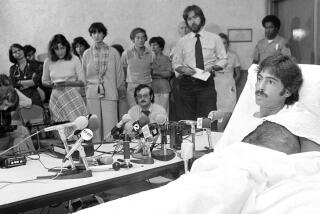Called In for Damage Control : ‘Spin Doctors’ Provide New Twist
- Share via
When a client comes to John Scanlon’s New York office wondering how to put a favorable “spin” on media coverage of a cause or company, Scanlon often starts with a simple exercise.
“I always try to write the reporter’s lead,” Scanlon says. “I actually sit down and . . . try to write the first two or three (para)graphs, and then I . . . try to convince . . . (the reporter) that, in fact, that is the story.”
How often does the “lead”--or that basic spin--actually show up in print?
“Far more often that not,” he says.
‘Spin Doctor’
Scanlon is a public relations expert--a “spin doctor.” His clients have included Philippine President Corazon Aquino, the tobacco industry, Drexel Burnham Lambert and such media giants as CBS, the Boston Globe and the Times Mirror Co., parent company of The Times.
Scanlon is probably best-known for his work on behalf of CBS when the network was fighting retired Gen. William Westmoreland’s libel suit over the documentary “The Uncounted Enemy: A Vietnam Deception.”
Before CBS hired Scanlon, media coverage of the case was dominated by charges that CBS had violated its own internal standards in producing the documentary. Under Scanlon’s guidance, the network admitted there were “substantive questions” about whether network standards had been violated, but “we then went to the substance of the documentary--was it true or false?” Scanlon says.
In time, the tone of coverage shifted, and while the case itself was settled out of court, the trade publication Public Relations Journal subsequently proclaimed CBS winner of “the public relations verdict.”
Scanlon usually wins such battles. He works hard and has close, long-term social relationships with many top media personalities. He also possesses shrewd insights into how the media actually function and he isn’t shy about self-promotion.
But Scanlon is hardly alone.
Howard Rubenstein has a client list that “reads like an interlocking directorate of who runs New York,” as the New York Times once put it, and Herb Schmertz spent years in virtual single-handed combat with the media on behalf of Mobil Oil Co. and the oil industry in general during the energy crisis.
Several years ago, when capsules of Tylenol were found laced with cyanide, drug maker Johnson & Johnson hired experts in “crisis management” public relations.
Their job was formidable. Other companies whose products had been involved in similar disasters had gone bankrupt or had been forced to withdraw their products permanently. But the spin doctors and James Burke, chief executive officer at Johnson & Johnson, decided quickly on a strategy:
Recall all bottles of Tylenol immediately and cancel all Tylenol advertising. Put Burke out front as the company’s spokesman. Position Johnson & Johnson as an innocent victim of a new form of terrorism.
When the company was ready to re-introduce Tylenol, it did so with a press conference broadcast by satellite to 600 journalists in 30 cities. Thus, it put its own spin on the event by going over the heads of the relative handful of reporters who would have come to the press conference in New York.
Johnson & Johnson was so successful that Tylenol recovered, the company survived and people now speak of the strategy as a textbook example of crisis management in public relations.
In contrast, when the tanker Exxon Valdez ran aground off Alaska in March, fouling Prince William Sound with almost 11 million gallons of oil, media coverage of the disaster made the Exxon Corp. look foolish, shortsighted, indecisive and insensitive. To this day, the company has not been able to put the slightest positive spin on the story.
What could Exxon have done differently?
‘On His Hands and Knees’
“Get the chairman on the airplane and have him on his hands and knees in front of the television cameras of America, washing rocks and birds in the first 24 to 48 hours . . . and I don’t mean in a suit and tie; I’m talking about in his lumberjack L. L. Beans,” says Albert J. Tortorella, director of the crisis management group at Burson-Marsteller in Los Angeles and a key figure in the Tylenol campaign.
Would that have been enough to offset all the negative news coverage? Probably not. But aggressive spin control would certainly have helped--especially if Exxon’s spin doctors had been able to persuade one or two key journalists that the company was not solely to blame.
“With few exceptions, there is an inherent pack psychology that permeates the media,” Tortorella says. “I rely on consensus journalism to do what I do. If I had a lot of independent-thinking journalists, I’d be in a lot of trouble.”
More to Read
Sign up for Essential California
The most important California stories and recommendations in your inbox every morning.
You may occasionally receive promotional content from the Los Angeles Times.













